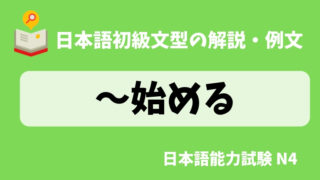解説:〜だす
●意味
動作の開始を表す。
To indicate the start of an action.
●接続
V(ます形)ます + だす
●よく一緒に使う言葉
急に、突然
●日本語能力試験(JLPT)のレベル
N4
●備考
話す人の意志を表す文には使えない。
You cannot use it in sentences that express the will of the speaker.
❌来週からの中国語の勉強をしだそう。
上の例の場合、「始める」を使うのが正しい。
例文
彼は私の顔を見ると、急にどこかへ向かって走り出した。
When he saw my face, he suddenly started running off somewhere.
あ~、食べ出したら止まらない。ダイエット中だから抑えなきゃ。
Ah, once I start eating, I can’t stop. I’m on a diet, so I have to control myself.
雨が急に降り出したので、コンビニで雨が止むのを待った。
It started raining suddenly, so I waited for the rain to stop at the convenience store.
電車の中で、赤ん坊が泣き出して、本当に大変だった。
A baby started crying on the train, and it was really tough.
まだ信号は赤なのに、急に車が走り出した。
The car suddenly started moving even though the traffic light was still red.
まだ乾杯してないのに、田中さんが急にビールを飲み出した。
Tanaka-san suddenly started drinking beer even though we hadn’t toasted yet.
仕事中なのに、ジョンさんが急に歌い出して、みんな驚いた。
Even though we were in the middle of work, John suddenly started singing, and everyone was surprised.
授業中にジョンさんがいきなり大きな声で笑い出した。
During class, John suddenly burst into laughter with a loud voice.
友達は家に入ると、すぐにゲームをし出した。
As soon as my friend entered the house, they immediately started playing games.
ジョンさんはいきなり怒り出した。
John suddenly started getting angry.
「〜だす」と「〜始める」の違い

類似文型




